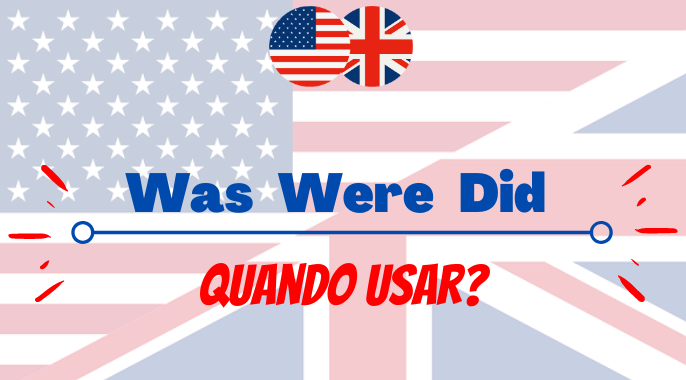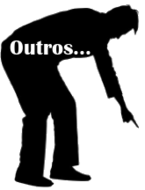
Past Continuous e to be (past) no inglês
Você conhece bem a conjugação do verbo to be no presente (I am, You are, He is, She is, It is, We are, You are e They are) – agora você sabe como é o passado do famoso verbo ser / estar? Este é o tema da aula de hoje! Além da conjugação deste importante verbo, vamos abordar também o tempo verbal Passado Contínuo.
Você verá que é muito simples de ser usado, portanto, preste atenção nos exemplos e exercícios. Um bom aprendizado para você!
DID – Simple Past
Antes de comentarmos a comentar sobre o Was e Were, vamos rever o DID. Was e Were são usados para o passado do verbo TO BE – ser, estar apenas. O DID é usado para outros verbos – não coloque-os juntos.
Did you travel to Brazil last year?
PAST TO BE – WAS / WERE
O passado do verbo to be tem a seguinte conjugação:
I / he/ she / it – WAS
You / we / they – WERE
Estes verbos significam SER e ESTAR no passado – veja estes exemplos.
Frases afirmativas
WAS
She was in New York last Easter.
I was in Michael’s house yesterday morning.
He was a teacher at London University.
My dog was on my bed in the afternoon.
WERE
You were in New York last year!
They were teachers in Chicago University.
We were good students in high school.
A estrutura é simples – sujeito + was / were.
Frases negativas
WAS
I wasn’t at home last night.
She wasn’t in her job in the morning.
He wasn’t in New Jersey last year.
My dog wasn’t eating a bone in the morning.
WERE
You weren’t in Michael’s party last Sunday.
They weren’t at the Italian restaurant last weekend.
We weren’t at home last Easter.
A estrutura é bem lógica: sujeito + WAS / WERE + NOT.
Frases interrogativas
Was she at home last weekend?
Were you in Vancouver last New Year?
Was he in Rio de Janeiro last weekend?
Were they at home on Monday?
Outra vez na forma interrogativa há uma inversão – a frase começa com o TO BE (WAS / WERE) + SUJEITO.
Vamos praticar um pouco?
Exercises:
A) Mike were – was at home last weekend.
B) Paul and Mike were – was in their job on Saturday.
C) Susan were – was in Montreal two years ago.
Choose the correct answer – negative
D) Paul and Susan weren’t – wasn’t in Brazil three weeks ago.
E) She wasn’t – weren’t in her company in the morning.
Choose the correct answer – interrogative
F) Was – Were Mike in your house last weekend?
G) Were – Was Donald and Mike at the university on the weekend?
Past continuous
Este tempo verbal é usado para expressar uma ação que estava em movimento em um determinado período do passado. A fórmula é simples: SUJEITO + TO BE (WAS / WERE) + VERB (ING) – Este verbo ING é que dá ideia de movimento a ação.
Observe estes exemplos:
Frases afirmativas
SUBJECT + TO BE IN THE PAST + VERB (ING)
Karen was working last Monday morning at home.
Peter and Michel were playing basketball last Friday evening.
Frases negativas
SUBJECT + TO BE IN THE PAST + NOT + VERB ING
Peter wasn’t working at home yesterday. He was in his job.
Mike and his wife Susan weren’t playing cards last Friday evening. They were watching a good movie at London Shopping Mall.
Frases interrogativas
TO BE IN THE PAST + SUBJECT + VERB ING
Were you studying English last Friday morning?
Was your sister working yesterday morning?
Como podemos ver, a função do to be (was e were) é essencial. O verbo com ING faz que o verbo tenha uma função de movimento.
Veja estas perguntas:
What were you doing on Friday morning?
I was studying History at London University.
What was your brother doing last weekend?
He was swimming in the club.
What were your friends doing in the morning?
They were preparing reports for the university.
What was your boyfriend reading last night?
He was reading a novel.
What were your cousins playing last Sunday?
They were playing the piano.
Vamos praticar mais?
Exercises – Choose the correct answer:
Frases afirmativas
A) Paul was work – was works – was working on Monday.
B) Paul was studying – was studies – was study Japanese today in the morning.
Frases negativas
C) My uncle was not works – was not working – was not worked yesterday.
D) My father were not working – were working not – was not working on Tuesday.
E) Paul was not playing – was not play – were not play soccer yesterday.
Frases interrogativas
F) Was – Were – Wasn’t your brother at home?
G) Were – Was – Were was your sister in the hospital?
Muito simples, não é verdade? Agora que você estudou estas explicações sabe quando usar was were e did no inglês, não é mesmo? Use bem o passado no seu dia a dia!

 Good morning, afternoon, evening, night ➽ Good morning, afternoon, evening, night ➽ |
 Como conversar melhor com nativos ➽ Como conversar melhor com nativos ➽ |